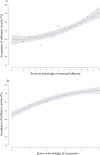Acceptance of seasonal influenza vaccination and associated factors among pregnant women in the context of COVID-19 pandemic in China: a multi-center cross-sectional study based on health belief model
- PMID: 34732157
- PMCID: PMC8564270
- DOI: 10.1186/s12884-021-04224-3
Acceptance of seasonal influenza vaccination and associated factors among pregnant women in the context of COVID-19 pandemic in China: a multi-center cross-sectional study based on health belief model
Abstract
Background: Seasonal influenza can circulate in parallel with coronavirus disease (COVID-19) in winter. In the context of COVID-19 pandemic, the risk of co-infection and the burden it poses on healthcare system calls for timely influenza vaccination among pregnant women, who are the priority population recommended for vaccination. We aimed to evaluate the acceptance of influenza vaccination and associated factors among pregnant women during COVID-19 pandemic, provide evidence to improve influenza vaccination among pregnant women, help reduce the risk of infection and alleviate the burden of healthcare system for co-infected patients.
Methods: We conducted a multi-center cross-sectional study among pregnant women in China. Sociodemographic characteristics, health status, knowledge on influenza, attitude towards vaccination, and health beliefs were collected. Locally weighted scatterplot smoothing regression analysis was used to evaluate the trends in the acceptance of influenza vaccine. Logistic regression was applied to identify factors associated with vaccination acceptance.
Results: The total acceptance rate was 76.5% (95%CI: 74.8-78.1%) among 2568 pregnant women enrolled. Only 8.3% of the participants had a history of seasonal influenza vaccination. In the logistic regression model, factors associated with the acceptance of influenza vaccine were western region, history of influenza vaccination, high knowledge of influenza infection and vaccination, high level of perceived susceptibility, perceived benefit, cues to action and low level of perceived barriers. Among 23.5% of the participants who had vaccine hesitancy, 48.0% of them were worried about side effect, 35.6% of them lacked confidence of vaccine safety.
Conclusions: Our findings highlighted that tailored strategies and publicity for influenza vaccination in the context of COVID-19 pandemic are warranted to reduce pregnant women's concerns, improve their knowledge, expand vaccine uptake and alleviate pressure for healthcare system.
Keywords: Acceptance; Associated factors; COVID-19; Influenza vaccination; Pregnant women.
© 2021. The Author(s).
Conflict of interest statement
The authors declare that they have no competing interests.
Figures



Similar articles
-
Seasonal Influenza Vaccine Acceptance among Pregnant Women in Zhejiang Province, China: Evidence Based on Health Belief Model.Int J Environ Res Public Health. 2017 Dec 11;14(12):1551. doi: 10.3390/ijerph14121551. Int J Environ Res Public Health. 2017. PMID: 29232882 Free PMC article.
-
Acceptance of a COVID-19 vaccine and associated factors among pregnant women in China: a multi-center cross-sectional study based on health belief model.Hum Vaccin Immunother. 2021 Aug 3;17(8):2378-2388. doi: 10.1080/21645515.2021.1892432. Epub 2021 May 14. Hum Vaccin Immunother. 2021. PMID: 33989109 Free PMC article.
-
[Technical guidelines for seasonal influenza vaccination in China (2020-2021)].Zhonghua Yu Fang Yi Xue Za Zhi. 2020 Oct 6;54(10):1035-1059. doi: 10.3760/cma.j.cn112150-20200911-01198. Zhonghua Yu Fang Yi Xue Za Zhi. 2020. PMID: 33131228 Chinese.
-
Sociodemographic and health-related determinants of seasonal influenza vaccination in pregnancy: A systematic review and meta-analysis of the evidence since 2000.Acta Obstet Gynecol Scand. 2021 Jun;100(6):997-1009. doi: 10.1111/aogs.14079. Epub 2021 Feb 17. Acta Obstet Gynecol Scand. 2021. PMID: 33420724
-
Knowledge about, attitude and acceptance towards, and predictors of intention to receive the COVID-19 vaccine among cancer patients in Eastern China: A cross-sectional survey.J Integr Med. 2022 Jan;20(1):34-44. doi: 10.1016/j.joim.2021.10.004. Epub 2021 Oct 26. J Integr Med. 2022. PMID: 34774463 Free PMC article. Review.
Cited by
-
Models of determinants of COVID-19 vaccine hesitancy in non-pregnant and pregnant population: Review of current literature".Hum Vaccin Immunother. 2022 Nov 30;18(6):2138047. doi: 10.1080/21645515.2022.2138047. Epub 2022 Nov 7. Hum Vaccin Immunother. 2022. PMID: 36345571 Free PMC article. Review.
-
Factors Influencing the Knowledge Gap regarding Influenza and Influenza Vaccination in the Context of COVID-19 Pandemic: A Cross-Sectional Survey in China.Vaccines (Basel). 2022 Jun 16;10(6):957. doi: 10.3390/vaccines10060957. Vaccines (Basel). 2022. PMID: 35746565 Free PMC article.
-
Health Systems Determinants of Delivery and Uptake of Maternal Vaccines in Low- and Middle-Income Countries: A Qualitative Systematic Review.Vaccines (Basel). 2023 Apr 19;11(4):869. doi: 10.3390/vaccines11040869. Vaccines (Basel). 2023. PMID: 37112781 Free PMC article. Review.
-
Do self-rated health and previous vaccine uptake influence the willingness to accept MPOX vaccine during a public health emergency of concern? A cross-sectional study.PLOS Glob Public Health. 2024 Aug 15;4(8):e0003564. doi: 10.1371/journal.pgph.0003564. eCollection 2024. PLOS Glob Public Health. 2024. PMID: 39146333 Free PMC article.
-
Pregnant Women's Knowledge of and Attitudes towards Influenza Vaccination during the COVID-19 Pandemic in Poland.Int J Environ Res Public Health. 2022 Apr 8;19(8):4504. doi: 10.3390/ijerph19084504. Int J Environ Res Public Health. 2022. PMID: 35457370 Free PMC article.
References
-
- World Health Organization (WHO). Covid-19 Weekly Epidemiological Update 2021; https://www.who.int/publications/m/item/weekly-epidemiological-update%2D.... Accessed 15 June 2021.
-
- Gaitonde DY, Moore FC, Morgan MK. Influenza: diagnosis and treatment. Am Fam Physician. 2019;100(12):751–758. - PubMed
Publication types
MeSH terms
Substances
LinkOut - more resources
Full Text Sources
Medical

